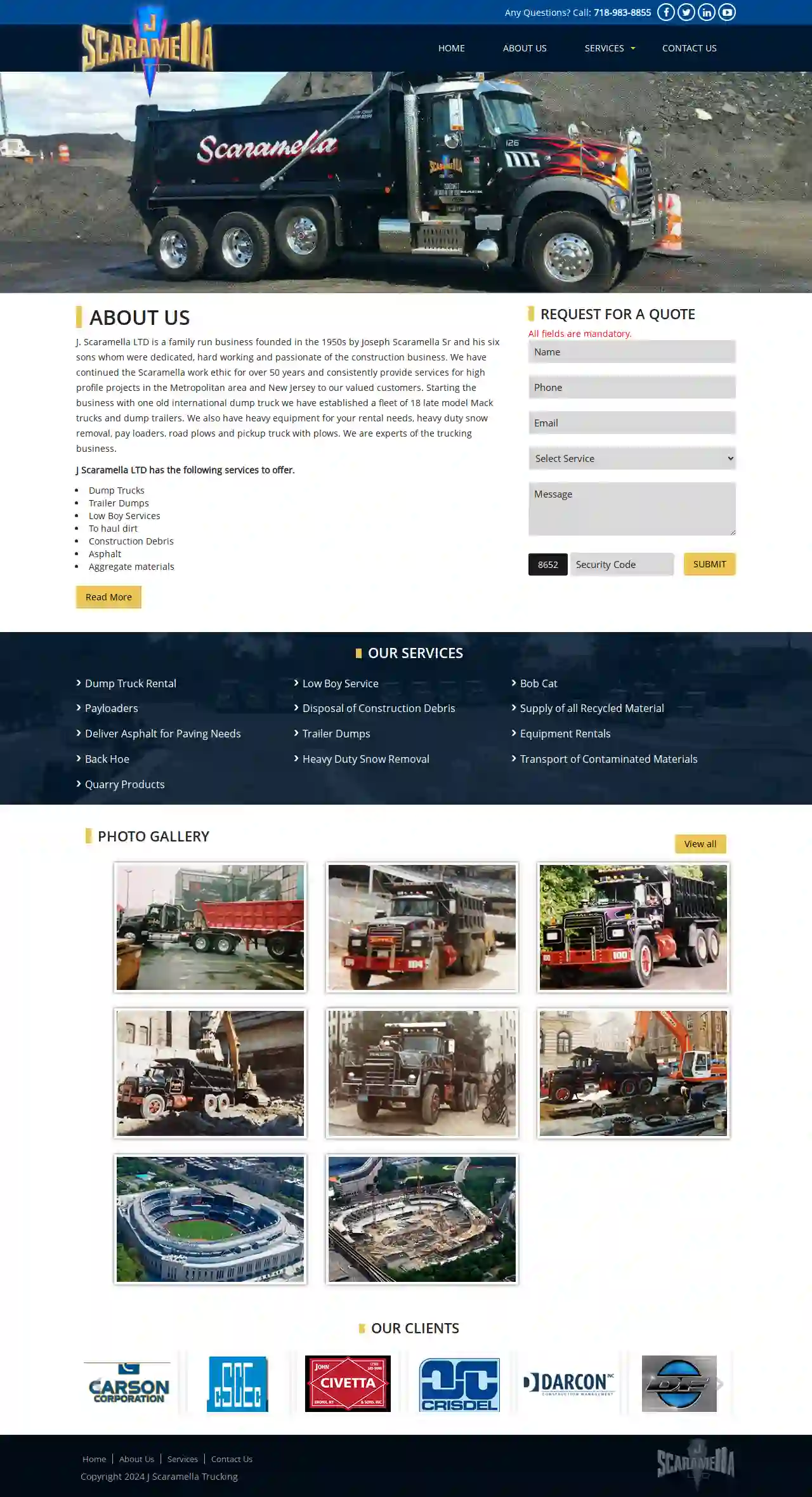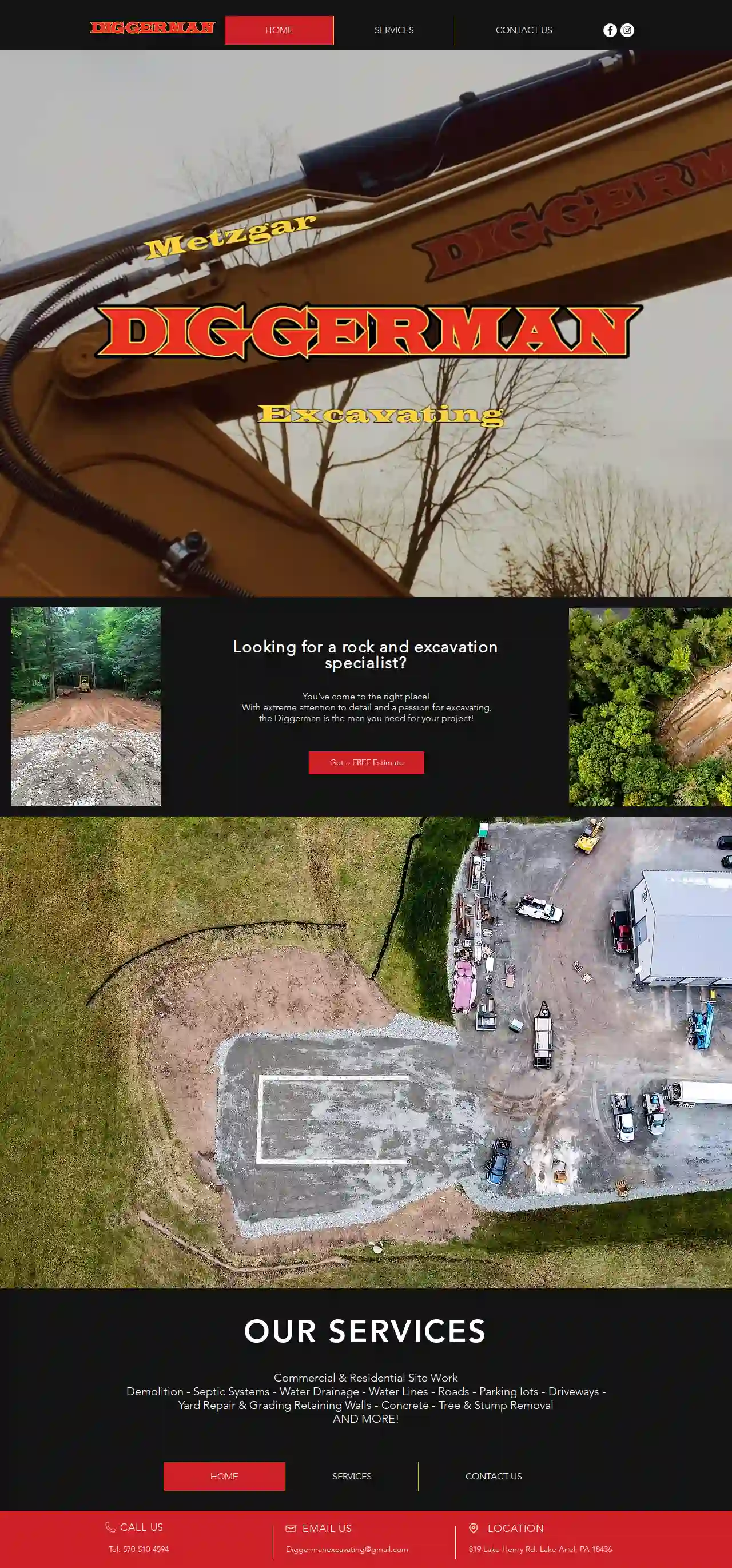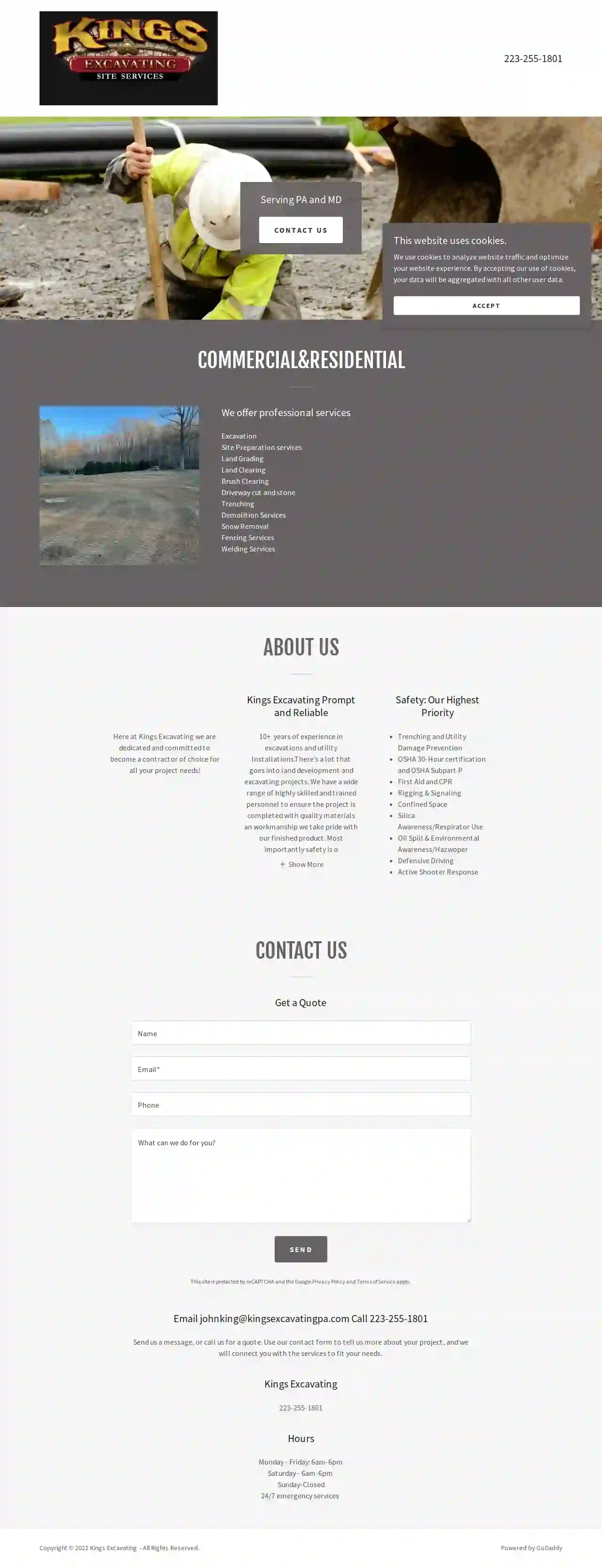Demolition Contractors South Huntingdon
Best Demo Contractors in South Huntingdon
Get multiple Building Demolition quotes for your project today! Compare profiles, reviews, accreditations, portfolio, etc... and choose the best offer.

ES Excavation
56 reviewsESExcavation.com, Newtown Square, Pennsylvania, 19073, USExcavation Contractors serving Southeast PA If you are a residential or commercial customer in Southeast PA and the surrounding region, ES Excavation is here to help anytime you need someone to dig in the dirt. We are a full-service excavating contractor, and can also provide you with landscape design and storm water solutions. We aim to complete each of our projects in an efficient and cost-effective way. We don’t cut corners and we always take proper precautions to prevent any potential problems and dangers while striving to ensure that the project is complete on time and under budget. We take the time to meet with all of our clients to ensure that every project is completed to their standards. Providing us with your vision, goals and timeline allows us to do our job even better. Every client we meet and do business with is satisfied with our work. That’s because we work with you, and have a genuine interest in achieving your project goals.
- Services
- Why Us?
- Gallery
Get Quote
Superior Earth Works, LLC
51 reviewsBel Air, Maryland, USIntroducing Superior Earth Works, LLC Transforming project visions into reality is our specialty at Superior Earth Works. Based in Bel Air, MD, we dedicate ourselves to providing top-quality excavation and concrete services for residential and commercial clients. Our goal is to achieve excellence in every project. By understanding our clients' needs and delivering beyond their expectations, we ensure that each project stands as a testament to superior craftsmanship and dedication. We believe that quality workmanship is the cornerstone of our business, and we strive to maintain the highest standards in every project, along with timely delivery and reasonable prices. As an experienced excavation contractor, we specialize in site clearing, ensuring that your land is ready for any new construction. Our demolition services are efficient and thorough, making way for new possibilities. With our bobcat services, we handle everything from land grading to site preparation with precision and care. Our expertise includes shoring services, providing the necessary support to safeguard your construction projects. Whether you require land demolition, grading, regrading, or resloping services, we have the skills and equipment to execute the job to perfection. We deliver impeccable building site preparation and construction site preparation. In addition to our excavation capabilities, we offer a full suite of concrete services. From driveways to patios, we deliver concrete work that enhances the utility and visual appeal of your property. Our concrete services are designed to withstand the test of time, providing durable and attractive surfaces that you can rely on. Choosing Superior Earth Works means choosing an excavation partner who values your project and strives to achieve superior results. Experience the difference that our dedication to excellence can make -- contact us today to discuss your excavation needs. Superior Earth Works in Bel Air, MD, is here to provide you with the superior service you deserve.
- Services
- Why Us?
- Gallery
Get Quote
David H. Martin Excavating, Inc.
4.350 reviews4961 Cumberland Highway, Chambersburg, 17202, USYour Complete Excavating Solution Your projects deserve a reliable partner in delivering highly trained and trusted excavation solutions for jobs of any size. Our highly trained team is equipped with the skills and capabilities designed for residential homeowners to commercial project managers. Excellence & Integrity We understand the frustrations that arise with extended project completion dates, unexpected costs, and uncommunicative teams. Excellence and integrity are at the core of everything we do—it’s not just what we do, but the foundation for all that we are. Expect your project to be completed and on time—everytime.
- Services
- Why Us?
- Our Team
- Testimonials
Get Quote
Scaramella Trucking
3.76 reviewsYork, USAbout Us J. Scaramella LTD is a family-run business founded in the 1950s by Joseph Scaramella Sr and his six sons, who were dedicated, hard-working, and passionate about the construction business. We have continued the Scaramella work ethic for over 50 years and consistently provide services for high-profile projects in the Metropolitan area and New Jersey to our valued customers. Starting the business with one old international dump truck, we have established a fleet of 18 late-model Mack trucks and dump trailers. We also have heavy equipment for your rental needs, heavy-duty snow removal, pay loaders, road plows, and pickup trucks with plows. We are experts in the trucking business.
- Services
- Why Us?
- Gallery
Get Quote
Diggerman Excavating
819 Lake Henry Rd., Lake Ariel, 18436, USLooking for a rock and excavation specialist? You've come to the right place! With extreme attention to detail and a passion for excavating, the Diggerman is the man you need for your project!
- Services
- Why Us?
- Gallery
Get Quote
Kings Excavating
Pittsburgh, USKings Excavating: Prompt and Reliable Here at Kings Excavating, we are dedicated and committed to becoming your contractor of choice for all your project needs! With over 10 years of experience in excavations and utility installations, we have a wide range of highly skilled and trained personnel to ensure your project is completed with quality materials and workmanship. We take pride in our finished product, and most importantly, safety is our number one priority. We strive to create a safe working environment for our employees and the public throughout every project. Safety: Our Highest Priority We prioritize safety in all our operations, adhering to the highest industry standards. Our team is equipped with the necessary certifications and training to ensure a safe and efficient work environment. Our commitment to safety includes: Trenching and Utility Damage Prevention OSHA 30-Hour certification and OSHA Subpart P First Aid and CPR Rigging & Signaling Confined Space Silica Awareness/Respirator Use Oil Spill & Environmental Awareness/Hazwoper Defensive Driving Active Shooter Response
- Services
- Why Us?
- Gallery
Get Quote
Brubacher Excavating Inc
4.561 reviews825 Reading Road, P.O. Box 528, Bowmansville, 17507, USAt the heart of our company are hundreds of team members who apply decades of experience to deliver Insight. On Site in service our clients and communities as we live out our mission of Shaping the World We Live In. Their character, commitment, and expertise combined with our integrated services and industry-leading fleet ensure we deliver quality results from start to finish. As an excavating company who proudly serves partners across Pennsylvania, Maryland and Delaware, we provide specialized industry expertise to deliver total client satisfaction. You can count on our team to work safely and efficiently and to get the job done right on time, every time. Our Core Values At Brubacher, we honor our core values as a team in the decisions we make, results we deliver, and experiences we provide. Safety Because Life Matters Integrity Do What Is Right Initiative Make It Happen Teamwork Better Together
- Services
- Why Us?
- Gallery
Get Quote
Warren's Excavation & Stone
51 reviews10000 10th Line, Tavistock, N0L 1P0, USWarren's Excavating: Your Trusted Partner for Excavation Services Warren's Excavating is a family-owned and operated business with over 20 years of experience in the excavation industry. We are committed to providing our clients with high-quality, reliable, and affordable services. Our team of experienced professionals is dedicated to exceeding your expectations and delivering exceptional results. We understand that every project is unique, and we take the time to listen to your needs and develop a customized plan that meets your specific requirements. Whether you're looking for site preparation, foundation excavation, utility installation, or any other excavation service, we have the expertise and equipment to get the job done right. At Warren's Excavating, we pride ourselves on our commitment to safety, quality, and customer satisfaction. We use only the latest equipment and techniques to ensure that your project is completed on time and within budget. We also offer free estimates and competitive pricing. Contact us today to learn more about our services and how we can help you with your next excavation project.
- Services
- Why Us?
Get Quote
Winola Excavating
57 reviews64 Benson Hollow Ln, Tunkhannock, 18657, USWinola Excavating – Delivering quality service and expert craftsmanship for all your construction and excavation needs. We are a full-service local contractor specializing in residential, commercial and industrial excavation and construction services. Our clients include homeowners, business owners, landlords, real estate agents, builders, contractors and developers. What sets us apart? Typically, we are able to provide same day estimates and will show up on time prepared to deliver exceptional service to you. In fact, we have limited to no rescheduling (dependant on weather), price our jobs fairly and get them done in a timely fashion. Your satisfaction is our number one goal. And with 10 years of customer service management experience, we know how to deliver.
- Services
- Why Us?
- Gallery
Get Quote
Sullivan Excavating and Landscaping
53 reviewsPO Box 104, Germansville, 18053, USWelcome to Sullivan Excavating and Landscaping. Sullivan Excavating and Landscaping, located in the Lehigh Valley, PA area, provides Excavating, Landscaping, Hardscaping, Material Delivery, Lawn Installation and Snow Removal Services. We service all of the Lehigh Valley including Macungie, Allentown, Bethlehem, Slaightington, Walnutport, Northampton and all surrounding areas. We are a family owned an operated business that takes pride in every job, regardless how big or how small. Our objective on every job is to complete the project on time and leave behind a happy customer. Our complete solutions combined with our Can-Do attitude make us the best choice for your excavating, landscaping and snow removal needs. We are truly your Solution For All Seasons! At Sullivan Excavating and Landscaping, we aren’t satisfied until you are. We aim to be your trusted source for all of your excavating needs, and we’ll work hard to earn and keep your business. We rely on the experience of our team and the high quality equipment we have at our disposal to bring you the finest excavation service in the Lehigh Valley. When you’re ready to discuss a new driveway, retaining wall, parking area or other project, we hope you’ll give us a call. Here’s a quick look at some of the reasons our customers love doing business with us: We are a full service excavation and landscaping service in the Lehigh Valley. We are a family owned and operated local business. Our team has significant experience in all facets of excavation. We have the tools and equipment necessary for jobs of all sizes. We always aim to provide excellent work and customer service at a great price. Our core business comes from excavating, landscaping, snow removal and material delivery, we are always willing to accept other heavy equipment work that a homeowner or contractor may need completed. Contact us today for an estimate.
- Services
- Why Us?
- Gallery
Get Quote
Over 22,076+ Excavation Pros in our network
Our excavation pros operate in South Huntingdon and surroundings!
ExcavationHQ has curated and vetted Top Excavation Pros arround South Huntingdon. Find a top & trustworthy business today.
Frequently Asked Questions About Demolition Contractors
- Waste Generation: Demolition generates a large volume of debris, contributing to landfill space and potentially releasing harmful substances into the environment if not disposed of properly.
- Air Pollution: Dust and particulate matter released during demolition can impact air quality, affecting human health and the environment.
- Noise Pollution: Demolition activities can generate significant noise, disturbing nearby residents and wildlife.
- Resource Depletion: Demolition consumes resources that could be salvaged and reused, contributing to resource depletion and environmental degradation.
- Feasibility Studies: Assessing the viability and challenges of a demolition project.
- Demolition Planning: Developing demolition plans, including method selection, sequencing, and safety procedures.
- Permitting Assistance: Navigating the demolition permitting process and ensuring compliance with regulations.
- Hazardous Material Surveys: Identifying and managing hazardous materials, such as asbestos and lead paint.
- Cost Estimating: Providing accurate cost estimates for demolition services.
- Project Management: Overseeing the demolition process and ensuring it proceeds as planned.
What is asbestos abatement?
What are the environmental impacts of demolition?
What is the role of a demolition consultant?
How can I tell if my building contains asbestos?
What is asbestos abatement?
What are the environmental impacts of demolition?
- Waste Generation: Demolition generates a large volume of debris, contributing to landfill space and potentially releasing harmful substances into the environment if not disposed of properly.
- Air Pollution: Dust and particulate matter released during demolition can impact air quality, affecting human health and the environment.
- Noise Pollution: Demolition activities can generate significant noise, disturbing nearby residents and wildlife.
- Resource Depletion: Demolition consumes resources that could be salvaged and reused, contributing to resource depletion and environmental degradation.
What is the role of a demolition consultant?
- Feasibility Studies: Assessing the viability and challenges of a demolition project.
- Demolition Planning: Developing demolition plans, including method selection, sequencing, and safety procedures.
- Permitting Assistance: Navigating the demolition permitting process and ensuring compliance with regulations.
- Hazardous Material Surveys: Identifying and managing hazardous materials, such as asbestos and lead paint.
- Cost Estimating: Providing accurate cost estimates for demolition services.
- Project Management: Overseeing the demolition process and ensuring it proceeds as planned.